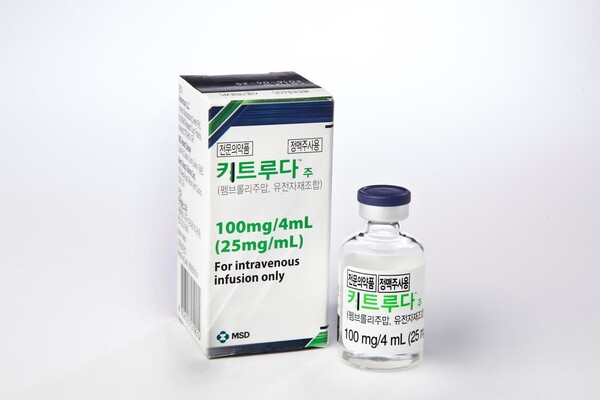Patients with endometrical cancer, now the most common gynecologic cancer in Korea following a fivefold increase in incidence over the past two decades, have had limited treatment options until recently.
However, MSD Korea said on Monday that its anti-PD-1 immunotherapy drug, Keytruda (pembrolizumab), was approved for use as a first-line treatment for patients with newly diagnosed advanced or recurrent endometrial cancer.

This approval marks the second global authorization for this immuno-oncology agent, following the U.S. FDA's approval in June, and is the first in Asia.
“Typically, drug approvals occur first in the U.S., then in Europe, with Korea receiving approvals later,” said an MSD Korea official. “However, given the challenging treatment environment and strong supporting data for the drug, Korea’s approval came relatively quickly.”
The approval is based on the phase 3 KEYNOTE-868/NRG-GY018 study, which evaluated Keytruda’s efficacy against a placebo in 816 patients with advanced endometrial cancer.
Participants were divided into two groups based on mismatch repair status: 225 with deficient (dMMR) and 591 with proficient (pMMR) repair. Keytruda was administered alone following an initial combination treatment of Keytruda with chemotherapy, including paclitaxel and carboplatin (PC, CarboTaxol).
The study showed that Keytruda significantly reduced the risk of disease progression and death compared to the control group, regardless of mismatch repair status.
For patients with dMMR tumors, the progression-free survival (PFS) rate at a median follow-up of 12 months was 74 percent, representing a 70 percent reduction in risk compared to the control group (38 percent) (HR=0.30; 95% CI, 0.19 to 0.48). For patients with pMMR tumors, analyzed at a median of 7.9 months, Keytruda reduced the risk of disease progression and death by 46 percent compared to the control group (HR=0.54; 95% CI, 0.41 to 0.71).
The National Comprehensive Cancer Network (NCCN) now recommends the Keytruda-chemotherapy combination as a first-line treatment for advanced or recurrent endometrial cancer at stages three and four.
“The approval of this new treatment is a major development for endometrial cancer patients, particularly given the limited options currently available,” said Professor Kim Jae-weon, a specialist in ovarian and endometrial cancers at Seoul National University Hospital. “Keytruda’s efficacy in both dMMR and pMMR populations is promising, and our clinical experience supports its use with confidence.”
Lee Min-hee, Executive Director of the Oncology Business Unit at MSD Korea, said, “We are excited to offer a new first-line treatment option for endometrial cancer patients in Korea and are committed to improving the treatment landscape for women’s cancers."
With this approval, Keytruda now has three indications for endometrial cancer: in combination with lenvatinib for advanced endometrial cancer post-systemic therapy (KEYNOTE-775); for microsatellite instability-high (MSI-H) or dMMR advanced endometrial cancer post-systemic therapy (KEYNOTE-158); and as a first-line treatment in combination with chemotherapy (KEYNOTE-868) for newly diagnosed advanced or recurrent endometrial cancer.
Related articles
- GI Innovation, MSD to evaluate new immunotherapy+Keytruda in resistant cancers in phase 2 study
- Why do surgeons choose Keytruda adjuvant therapy despite complicated lung cancer surgery?
- Celltrion's CT-P51 biosimilar to Keytruda receives FDA nod for phase 3 study
- [Column]‘If your family has many colon and endometrial cancer patients, suspect Lynch syndrome’
- ‘Endometrial cancer survival rises thanks to immunotherapies'
- 'Padcev+Keytruda combo sets new standard for 1st-line urothelial carcinoma treatment'
- Phase 3 study shows Keytruda's potential in endometrial cancer, though high costs pose barriers
- Keytruda in triple-negative breast cancer faces accessibility challenges in Korea despite promising survival data
- MSD Korea exec appointed as commercial strategy & operations director for MSD ANZ

